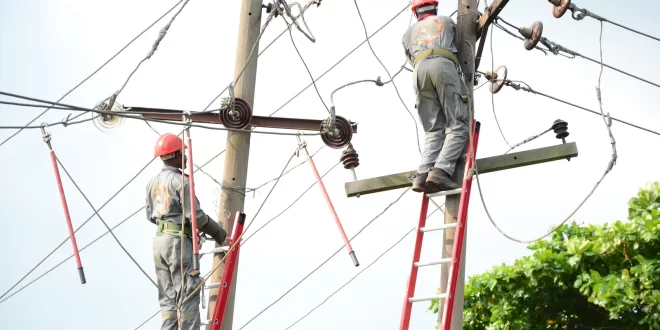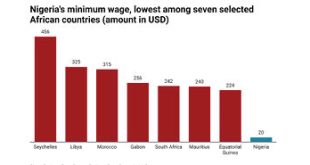
The ‘Voice of Reason’ opinion column is published every Wednesday, focusing on trending national issues, especially politics, economics, and security matters.
For over a month, Nigerians, the Nigerian Electricity Regulatory Commission (NERC), and power distribution companies (Discos) have been embroiled in disputes over an increase in electricity rates. This came after consumers were classified into vague band categories, leaving many areas without power despite the steep price hike. This situation reflects Nigeria’s inadequate electricity generation and supply, which still hovers around 6,000 megawatts after more than 60 years of independence.
Nigeria, Africa’s most populous nation and one of its largest economies struggles with a chronic electricity deficit. This shortfall not only disrupts daily life but also hinders the country’s economic growth potential. In the absence of reliable power, many manufacturers have resorted to using diesel generators to power their operations. The high cost of diesel, deregulated by the government over a decade ago to make it cheaper and more accessible, has worsened the situation, further burdening manufacturers who inevitably pass these costs onto consumers.
In recent months, several notable multinational companies have exited the Nigerian market, citing various factors, primarily the unreliable electricity supply, and high exchange rates, which compound the already high cost of doing business. In such a dire situation, it is challenging to envision how the President’s current efforts to attract foreign direct investment (FDI) will be successful. Investors are unlikely to flock to a country where longstanding multinationals are departing.
The inadequate power supply severely impacts small and medium-scale enterprises (SMEs), the main drivers of the economy. These enterprises employ millions of youths, more than large corporations, and many of today’s advanced and emerging companies owe their success to government support. In Nigeria, these enterprises struggle with the lack of reliable power and excessive taxation from all levels of government.
Many SMEs that secured loans from public and private credit agencies have shut down due to the financial burden of sourcing private power in the absence of national electricity. Those that manage to stay afloat cannot compete with imported products because their manufacturing costs are higher.
Across sectors such as health, education, tourism, entertainment, telecommunications, ICT, and households, inadequate power supply continues to be a significant challenge. Unfortunately, the government seems to have exhausted ideas on how to revitalise the sector and make it more effective in driving economic growth. In 2015, Nigeria was recognised as Africa’s largest economy, but by 2024, it had fallen to fourth place, behind South Africa, Egypt, and Algeria.
A closer look at government efforts reveals that corruption has been the primary impediment to progress in Nigeria’s power sector. Between 1999 and 2007, former President Olusegun Obasanjo invested over a billion dollars in attempting to revive the power sector. However, this money disappeared into private pockets, and to this day, no one has been held accountable.
The deregulation of the sector was marred by a lack of transparency, with the Bureau of Public Enterprises (BPE) handing over assets of the Power Holding Company of Nigeria (PHCN) to cronies and associates who were ill-equipped to manage the complex power business. Today, these companies are mired in debt and seeking federal bailouts, while Nigerians continue to suffer.
Compounding the problem, the Federal Government retained full ownership of the Transmission Company of Nigeria (TCN), the sole transmission entity in the electricity value chain. This has hampered efficiency, as TCN operates as a government parastatal subject to bureaucratic red tape, causing delays in essential maintenance and downtime responses.
Communities that have paid for transformers often wait for between six months and a year for installation, even though they are not meant to pay for them in the first place. This inefficiency extends to other components needed to provide electricity for both private and industrial consumption.
Additionally, the national grid infrastructure urgently needs upgrading, as frequent collapses result in significant economic losses. In one month alone, the grid collapsed three times, leading to substantial disruptions. .
Despite successes in other countries, Nigeria struggles to replicate these models. Economies like Egypt, Vietnam, South Africa, Indonesia, Malaysia, and Singapore have seen massive economic growth by investing heavily in the private sector. These stories are well-known in Nigeria, prompting questions about why the Nigerian Government cannot follow suit.
At the end of Muhammadu Buhari’s administration, the electricity sector was unbundled and moved to the concurrent legislative list, allowing both federal and state governments to legislate on it. Some states are now taking advantage of this to build their own generating plants. While this is a positive development, the current administration must ensure that no obstacles hinder this progress. If states generate power but leave transmission solely in the hands of TCN, it would undermine the policy’s effectiveness.
Gas is a crucial component of electricity generation, and Nigeria has the largest gas reserves in Africa. However, the country has struggled to supply its generating plants with this abundant resource. Many turbines remain inactive because their specifications do not match Nigeria’s gas supply models. Future power plants must align their models with Nigeria’s gas types to avoid frustrating plant owners who have invested billions only to find they cannot power their plants.
As the government strives to provide uninterrupted power to households and businesses, it must also consider renewable energy, which is gaining global traction. Many countries are now focusing on renewable energy for electricity supply. While Nigeria addresses its current challenges, it must also invest in renewable energy to leverage opportunities in this emerging sector. This will help ensure a steady power supply for personal use and drive economic growth, maintaining Nigeria’s status as Africa’s largest economy and true giant.
To tackle Nigeria’s electricity deficit, several critical measures must be implemented. First, addressing corruption within the power sector is essential. Transparent and accountable practices must be established to ensure funds allocated for electricity projects are used effectively. This includes holding individuals accountable for past misappropriations and ensuring future investments are protected from corruption.
Second, the government must prioritise upgrading the national grid infrastructure. Modernising the grid will reduce the frequency of collapses and improve efficiency. Investments should be made in advanced technologies and maintenance practices to ensure the grid can handle increased power generation and distribution. .
Third, the private sector must be empowered to play a more significant role in electricity generation and distribution. Encouraging private investment in the power sector can lead to increased competition, innovation, and efficiency. The government should provide incentives for private companies to invest in renewable energy projects, which can help diversify the energy mix and reduce reliance on traditional fossil fuels.
Fourth, state governments should be encouraged to develop their power generation capabilities. By decentralising power generation, states can tailor their energy solutions to meet local needs and reduce the burden on the national grid. This approach can also promote regional economic development and create jobs within the states.
Fifth, there should be a focus on training and capacity building within the power sector. Investing in the education and training of engineers, technicians, and other professionals will ensure a skilled workforce capable of maintaining and operating advanced power systems. This can also foster innovation and drive the development of new technologies within the sector.
Lastly, public awareness and engagement are crucial. Educating the public about energy conservation and efficient usage can help reduce the overall electricity demand. Additionally, involving communities in the planning and implementation of power projects can lead to more sustainable and accepted solutions.
In conclusion, addressing Nigeria’s electricity deficit is imperative for the country’s economic growth and development. By tackling corruption, modernising infrastructure, empowering the private sector, decentralising power generation, investing in human capital, and promoting public awareness, Nigeria can overcome its electricity challenges.
These measures will not only improve the quality of life for Nigerians but also attract foreign investment, stimulate economic growth, and restore Nigeria’s position as Africa’s largest economy. The journey towards a stable and reliable power supply is complex, but with concerted efforts and strategic planning, it is achievable.
 National Telescope national telescope newspaper
National Telescope national telescope newspaper




